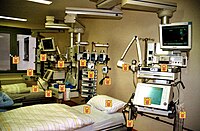
Photo from wikipedia
Hospital acquired infections are common, costly, and potentially preventable adverse events. This study aimed to determine the effect of the COVID-19 pandemic-related escalation in infection prevention and control measures on… Click to show full abstract
Hospital acquired infections are common, costly, and potentially preventable adverse events. This study aimed to determine the effect of the COVID-19 pandemic-related escalation in infection prevention and control measures on the incidence of hospital acquired infection in surgical patients in a low COVID-19 environment in Australia. This was a retrospective cohort study in a tertiary institution. All patients undergoing a surgical procedure from 1 April 2020 to 30 June 2020 (COVID-19 pandemic period) were compared to patients pre-pandemic (1 April 2019–30 June 2019). The primary outcome investigated was odds of overall hospital acquired infection. The secondary outcome was patterns of involved microorganisms. Univariable and multivariable logistic regression analysis was performed to assess odds of hospital acquired infection. There were 5945 admission episodes included in this study, 224 (6.6%) episodes had hospital acquired infections in 2019 and 179 (7.1%) in 2020. Univariable logistic regression analysis demonstrated no evidence of change in odds of having a hospital acquired infection between cohorts (OR 1.08, 95% CI 0.88–1.33, P = 0.434). The multivariable regression analysis adjusting for potentially confounding co-variables also demonstrated no evidence of change in odds of hospital acquired infection (OR 0.93, 95% CI 0.74–1.16, P = 0.530). Increased infection prevention and control measures did not affect the incidence of hospital acquired infection in surgical patients in our institution, suggesting that there may be a plateau effect with these measures in a system with a pre-existing high baseline of practice.
Journal Title: World Journal of Surgery
Year Published: 2022
Link to full text (if available)
Share on Social Media: Sign Up to like & get
recommendations!